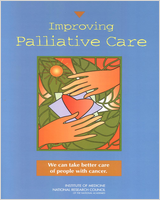
“My mother had a painful bone cancer. I couldn't buy her prescribed painkiller at my local drug store. It took me hours on the bus to get what she needed.”
Bernadette, 45, daughter of Wilhelmina, 66
It is important that all people have access to palliative care. The need is great in many underserved communities, yet palliative care is often not available. For example, African-Americans have a higher rate of certain cancers and of death from cancer than do whites. Yet African-Americans use hospice care less often than other groups. African-Americans and other ethnic communities have a long history of unequal treatment in our health care system. There may be no hospice care available in low-income, inner-city, or rural areas. Many drug stores in these areas do not stock strong pain medications.
There is a huge need for palliative care in ethnic communities. Another issue is that people from various cultures have differing beliefs and traditions regarding care of the dying. Doctors and nurses need to give care that respects these customs. As a society, we need to:
- Train people to give respectful care.
- Research the needs of underserved ethnic groups when it comes to end-of-life care.
- Find ways to make sure all people get the care they need.
- All people need better access to palliative care. - Improving Palliative CareAll people need better access to palliative care. - Improving Palliative Care
- Mus musculus spermatogenesis associated, serine-rich 2 (Spats2), transcript vari...Mus musculus spermatogenesis associated, serine-rich 2 (Spats2), transcript variant 6, mRNAgi|2463694801|ref|NM_001418668.1|Nucleotide
- Acanthobrama persidis voucher ZM-CBSUP3088 cytochrome b (cytb) gene, partial cds...Acanthobrama persidis voucher ZM-CBSUP3088 cytochrome b (cytb) gene, partial cds; mitochondrialgi|969987141|gb|KT321512.1|Nucleotide
- Petroleuciscus persidis voucher MNCN AT5189 cytochrome oxidase subunit I (COI) g...Petroleuciscus persidis voucher MNCN AT5189 cytochrome oxidase subunit I (COI) gene, partial cds; mitochondrialgi|307090548|gb|HM560282.1|Nucleotide
- PLA2G4F [Tympanuchus pallidicinctus]PLA2G4F [Tympanuchus pallidicinctus]Gene ID:128087419Gene
Your browsing activity is empty.
Activity recording is turned off.
See more...
